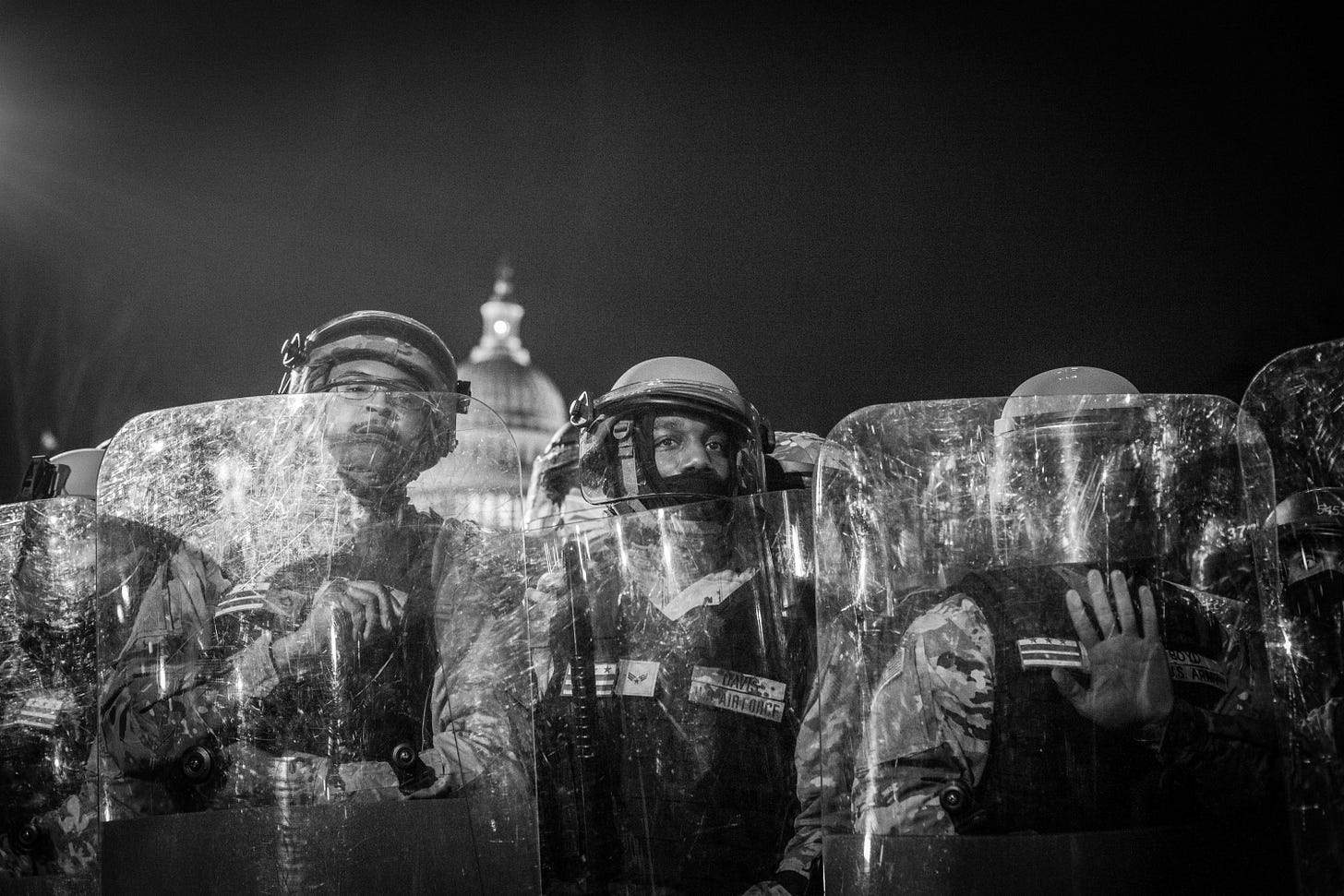Two Capitol Cops Sue Trump for Jan. 6—What Are Their Chances?
They allege that he “inflamed, encouraged, incited, directed, and aided and abetted” the insurrectionist mob that attacked them.

Yesterday, two Capitol police officers who were injured in the Jan. 6 insurrection sued Donald J. Trump in federal court in Washington, D.C., alleging a series of civil torts under District of Columbia law. They seek compensatory and punitive damages from Trump personally. The complaint alleges in detail that the then-president stoked the insurrection through tweets and speeches, culminating in his address to the crowd at the rally he summoned to Washington, in which he claimed the election was “rigged” and “stolen,” said that “when you catch somebody in a fraud, you’re allowed to go by very different rules,” and gave marching orders: “we’re going to the Capitol . . . to take back our country.”
The officers swiftly became mired in the chaos and violence, were sprayed with chemicals, struck with fists and other objects, and called the n-word. One of the two officers wound up with bloody cuts and abrasions after being pinned against a large metal door. The other suffered injuries to his head and back, and allegedly remains psychologically “haunted by the memory of being attacked,” unable to sleep.
The sad reality is that these heroic officers’ case will likely be rebuffed by a defense motion to dismiss the case based on—yet again—Trump’s immunity as president of the United States. Unlike Trump’s broad claims of immunity from any legal scrutiny while president, which the Supreme Court properly rejected, this one is likely to have serious legal weight.
The complaint cites five counts against Trump. Although assault and battery are crimes, aiding and abetting assault and battery can also give rise to civil liability under some state laws. The plaintiffs raise that claim under D.C. law here, and further allege that Trump directed the rioters to commit intentional infliction of emotional distress—a more traditional tort—as well as a couple of violations of the D.C. Code, including incitement to riot and disorderly conduct.
Keep in mind that these are civil charges for money damages; they cannot conceivably put Donald Trump in jail. Only the government can do that. As is now well known, the Justice Department refuses as a matter of policy to contemplate criminal action against a sitting president, regardless of the severity of the facts. Yet, as even former Senate Majority Leader Mitch McConnell noted in explaining his lame vote to acquit Trump of the second impeachment charge, so long as the applicable statute of limitations has not run, criminal charges can be brought against Trump now that he is no longer president.
But the same does not clearly hold true for civil claims. In Nixon v. Fitzgerald, the Supreme Court in 1982 held that presidents have “absolute immunity” from liability for civil damages arising from any official action taken while in office. That case involved an U.S. Air Force employee who testified before a congressional subcommittee about cost overruns and other problems with the development of a particular aircraft. The employee was later fired, and his job eliminated. After a complaint to the federal Civil Service Commission failed, he sued for damages in federal district court, naming various Defense Department and White House officials, including President Nixon himself.
The Supreme Court dismissed the claim against Nixon, concluding that “as a former President of the United States, [he] is entitled to absolute immunity from damages liability predicated on his official acts.” Note that this genre of immunity extends past a president’s term of office, even though—as the Court later held in Clinton v. Jones—a president can be sued while in office over conduct that occurred prior to being sworn in. In short, presidents have to be able to do their jobs without fear of civil liability. On the same rationale, the same immunity applies to members of Congress—in their case, it is even written into the Constitution—federal judges, and prosecutors.
The plaintiffs’ complaint doesn’t attempt to stave off the inevitable immunity argument by asserting, for example, that Trump’s actions on Jan. 6 cannot be considered an “official act” within the meaning of Nixon because they were “ultra vires”—i.e., beyond the proper powers of the president under Article II of the Constitution. Presumably, the plaintiffs’ seemingly able lawyers have an argument or two up their sleeves, which could conceivably produce new law around the scope of presidential power and presidential immunity. Such clarity and shoring up are badly needed in the wake of the Trump presidency and its assault on American democracy.
One thing remains of note under Nixon: The Court went out of its way to make clear that “we need not address directly the immunity question as it would arise if Congress expressly had created a damages action against the President of the United States.” Congress could still do this by passing a statute making presidents civilly liable for inciting insurrections.
If there is to be justice and accountability for Trump’s wrongdoing on and before Jan. 6, therefore, Congress has to be the institution to do it. Since House Speaker Nancy Pelosi’s February call for a 9/11-style commission to investigate the Capitol riots, however, Congress has gone deathly silent on the subject. This nonfeasance adds insult to the officers’ injuries. If nothing else, their lawsuit should reboot Pelosi’s call for serious scrutiny into Trump’s role in the fateful day that killed five people, including a Capitol police colleague, and threatened American democracy itself.


